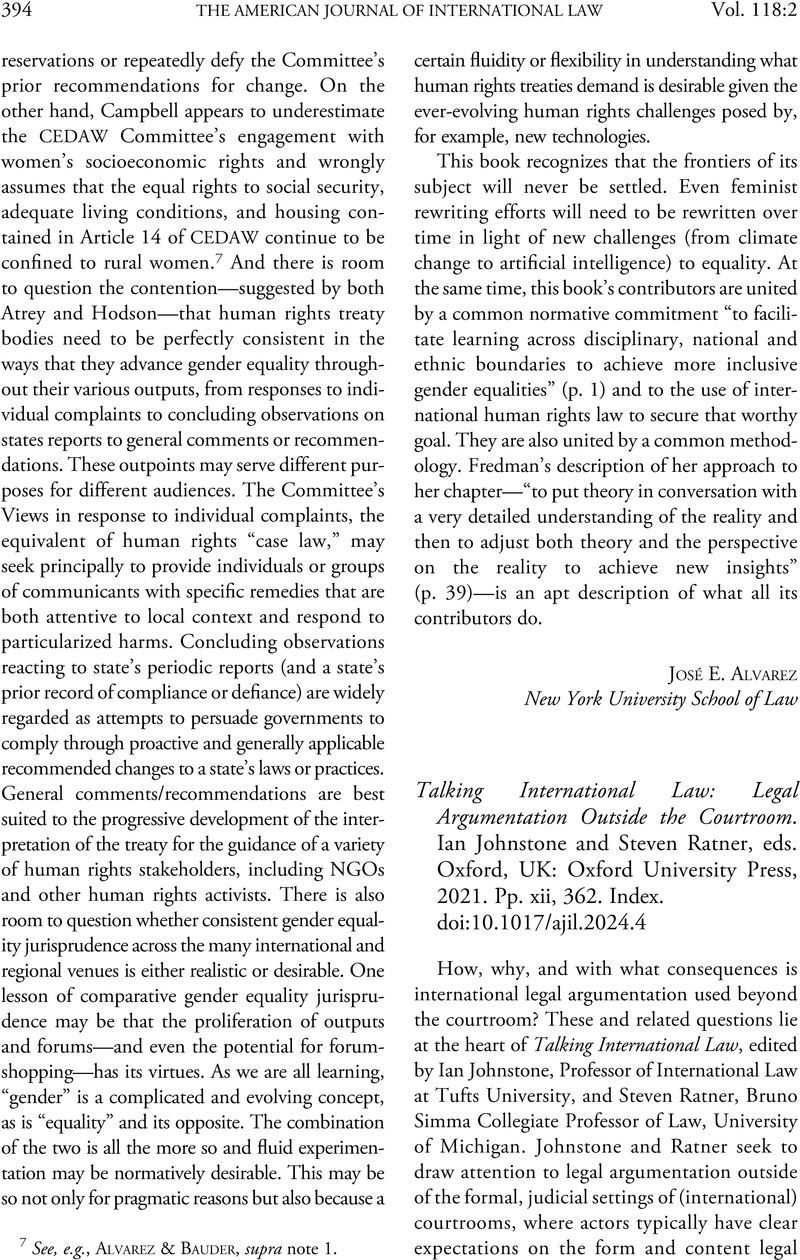No CrossRef data available.
Article contents
Talking International Law: Legal Argumentation Outside the Courtroom. Ian Johnstone and Steven Ratner, eds. Oxford, UK: Oxford University Press, 2021. Pp. xii, 362. Index.
Review products
Published online by Cambridge University Press: 29 April 2024
Abstract

- Type
- Book Reviews
- Information
- Copyright
- Copyright © The Author(s), 2024. Published by Cambridge University Press on behalf of American Society of International Law
Footnotes
This review was completed with the support of the Danish National Research Foundation Grant no. DNRF169.
References
1 Meierhenrich, Jens, The Practice of International Law: A Theoretical Analysis, 76 L. & Contemp. Probs. 1, 6 (2014)Google Scholar.
2 As chronicled in Zimmermann's contribution to the volume (pp. 267–69), and additionally represented by Brunnée's intervention (pp. 239–62), building on her prior research with Stephen Toope: Jutta Brunnée & Stephen J. Toope, Legitimacy and Legality in International Law: An Interactional Account (2010).
3 Hutchings, Kimberly & Owens, Patricia, Women Thinkers and the Canon of International Thought: Recovery, Rejection, and Reconstitution, 115 Am. Pol. Sci. Rev. 347 (2021)CrossRefGoogle Scholar.
4 E.g., Tallberg, Jonas & Zürn, Michael, The Legitimacy and Legitimation of International Organizations: Introduction and Framework, 14 Rev. Int'l Orgs. 581 (2019)Google Scholar.
5 E.g., Jan Aart Scholte & Jonas Tallberg, Theorizing the Institutional Sources of Global Governance Legitimacy, in Legitimacy in Global Governance: Sources, Processes, and Consequences (Jonas Tallberg, Karin Bäckstrand & Jan Aart Scholte eds., 2018); Tallberg & Zürn, supra note 4, at 593–95.
6 Bernstein, Steven, Legitimacy in Intergovernmental and Non-state Global Governance, 18 Rev. Int'l Pol. Econ. 17 (2011)Google Scholar.
7 Dominik Zaum, International Organizations, Legitimacy and Legitimation, in Legitimating International Organizations 16–19 (Dominik Zaum ed., 2013).
8 Gronau, Jennifer & Schmidtke, Henning, The Quest for Legitimacy in World Politics: International Institutions’ Legitimation Strategies, 42 Rev. Int'l Stud. 535 (2016)Google Scholar.
9 Magdalena Bexell & Kristina Jönsson, Audiences of (De)Legitimation in Global Governance, in Legitimacy in Global Governance, supra note 5, at 129–31.
10 Adler-Nissen, Rebecca & Eggeling, Kristin Anabel, Blended Diplomacy: The Entanglement and Contestation of Digital Technologies in Everyday Diplomatic Practice, 28 Eur. J. Int'l Rel. 640 (2022)Google Scholar.
11 Ecker-Ehrhardt, Matthias, Public Legitimation by “Going Personal”? The Ambiguous Role of International Organization Officials on Social Media, 11 Pol. & Governance 213 (2023)Google Scholar.
12 On such a distinction, e.g., Holtermann, Jakob v. H. & Madsen, Mikael Rask, European New Legal Realism and International Law: How to Make International Law Intelligible, 28 Leiden J. Int'l L. 211 (2015)CrossRefGoogle Scholar.
13 Ralph, Jason & Gifkins, Jess, The Purpose of United Nations Security Council Practice: Contesting Competence Claims in the Normative Context Created by the Responsibility to Protect, 23 Eur. J. Int'l Rel. 630 (2016)Google ScholarPubMed.




